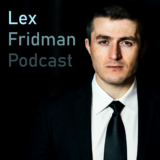Stephen Schwarzman is the CEO and Co-Founder of Blackstone, one of the world’s leading investment firms with over 530 billion dollars of assets under ...
Dawn Song is a professor of computer science at UC Berkeley with research interests in security, most recently with a focus on the intersection between ...
Ilya Sutskever is the co-founder of OpenAI, is one of the most cited computer scientist in history with over 165,000 citations, and to me, is one of the most ...
Daphne Koller is a professor of computer science at Stanford University, a co-founder of Coursera with Andrew Ng and Founder and CEO of insitro, a company at ...
Harry Cliff is a particle physicist at the University of Cambridge working on the Large Hadron Collider beauty experiment that specializes in searching for ...
Jack Dorsey is the co-founder and CEO of Twitter and the founder and CEO of Square. Support this podcast by signing up with these sponsors: – ...
Dmitry Korkin is a professor of bioinformatics and computational biology at Worcester Polytechnic Institute, where he specializes in bioinformatics of complex ...
Stephen Wolfram is a computer scientist, mathematician, and theoretical physicist who is the founder and CEO of Wolfram Research, a company behind Mathematica, ...
Eric Weinstein is a mathematician with a bold and piercing intelligence, unafraid to explore the biggest questions in the universe and shine a light on the ...
Richard Dawkins is an evolutionary biologist, and author of The Selfish Gene, The Blind Watchmaker, The God Delusion, The Magic of Reality, The Greatest Show ...

